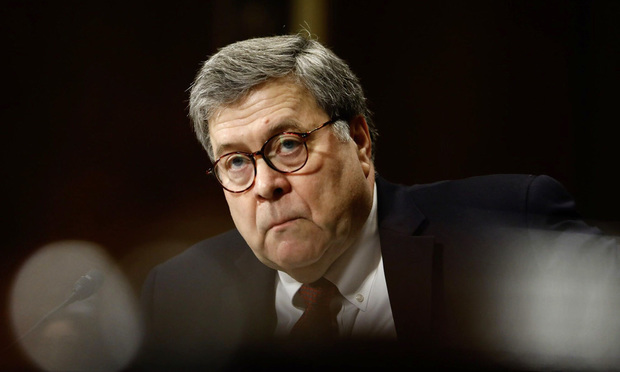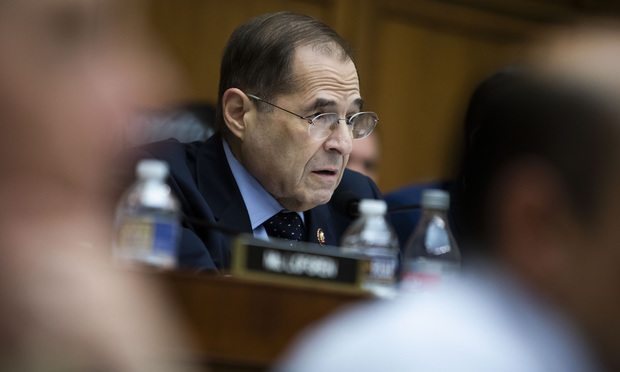Refusing Testimony, William Barr Picks Fresh Fight With House Democrats
House Judiciary Chairman Jerrold Nadler: “I understand why he wants to avoid that kind of scrutiny, but when push comes to shove, the administration may not dictate the terms of a hearing in our hearing room.”
May 01, 2019 at 07:40 PM
6 minute read
The original version of this story was published on National Law Journal
 Attorney General Willam Barr testifies before the Senate Judiciary Committee on the Mueller report May 1. Photo: Diego M. Radzinschi/NLJ
Attorney General Willam Barr testifies before the Senate Judiciary Committee on the Mueller report May 1. Photo: Diego M. Radzinschi/NLJ
As U.S. Attorney General William Barr faced Senate Democrats on Wednesday, defending his rollout of Special Counsel Robert Mueller III's report on the Russia investigation, a separate storm brewed in a House hearing room half a mile away.
In preparation for a Thursday hearing with Barr, the House Judiciary Committee voted along party lines to allow Republican and Democratic staff to question the attorney general. It was just the move the Justice Department warned would deter Barr from appearing. Hours after his Senate testimony, Barr announced he wouldn't be showing up Thursday.
In a statement, a Justice Department spokesperson described the conditions set by the committee's chairman, U.S. Rep. Jerrold Nadler, D-New York, as “unprecedented and unnecessary.”
“Congress and the executive branch are co-equal branches of government, and each have a constitutional obligation to respect and accommodate one another's legitimate interests. Chairman Nadler's insistence on having staff question the attorney general, a Senate-confirmed cabinet member, is inappropriate,” Justice Department spokeswoman Kerri Kupec said. “Further, in light of the fact that the majority of the House Judiciary Committee—including Chairman Nadler—are themselves attorneys, and the chairman has the ability and authority to fashion the hearing in a way that allows for efficient and thorough questioning by the members themselves, the chairman's request is also unnecessary.”
Nadler responded that the committee would still convene “as planned” Thursday morning.
“Although we have worked around the clock to address his concerns, Attorney General Barr has informed us that he will not attend tomorrow's hearing. Given his lack of candor in describing the work of the special counsel, our members were right to insist that staff counsel be permitted to question the attorney general,” he said. “I understand why he wants to avoid that kind of scrutiny, but when push comes to shove, the administration may not dictate the terms of a hearing in our hearing room.”
 Congressman Jerrod Nadler (D-NY) chairs a House Judiciary Committee meeting. Photo: Diego M. Radzinschi/NLJ
Congressman Jerrod Nadler (D-NY) chairs a House Judiciary Committee meeting. Photo: Diego M. Radzinschi/NLJBarr's move only further escalated tensions between the Trump administration and House Democrats. In recent weeks, Trump has decried House Democrats' subpoenas and other demands for information as partisan and stated publicly that he is opposed to current and former White House officials testifying before Congress.
Last week, two Trump administration officials skipped depositions with the House Oversight and Reform Committee. In both cases, the officials cited objections to a House rule that prevents administration lawyers from sitting in on depositions of government officials.
On Wednesday, Republicans on the House Judiciary Committee criticized the move to allow staff to question Barr, saying it would be make the hearing resemble an impeachment proceeding. Staff-led questioning would, in fact, not be without precedent: As former Obama White House counsel Neil Eggleston, now a partner at Kirkland & Ellis, noted Tuesday, congressional staff conducted questioning in hearings in 1987 concerning the Iran-Contra affair.
In a statement earlier this week, Nadler said the House has permitted staff “to question witnesses in the past, under both Democratic and Republican majorities, during both public hearings and private transcribed interviews.”
On Wednesday, Republicans appeared to goad Democratic members of the committee. Their question to Democrats: Why not handle the questioning yourselves?
“You can do this,” said U.S. Rep. Doug Collins of Georgia, the top Republican on the committee. “If a staff member wants to ask questions, run for Congress. Put your money down, take a chance and run for Congress.”
The Democrats' question to Republicans: What is Barr afraid of?
“Attorney General Barr publicly committed to being transparent regarding the special counsel investigation. He should welcome the opportunity to speak candidly and at length before the House Judiciary Committee and the American people,” Nadler said. “I don't know what he's afraid of from questioning by staff counsel.”
Nadler's format said lawmakers would first get to question Barr, followed by an additional hour of questioning that would be evenly split by Democratic and Republican staff. The format, he said, would foster a more in-depth conversation about Mueller's findings on Russia's interference in the 2016 and instances of possible obstruction by Trump.
In his office's 448-page report, Mueller determined the Trump campaign did not conspire with the Kremlin to interfere in the election, but he did not reach a conclusion on whether Trump sought to obstruct the investigation. Mueller said that “while this report does not conclude that the president committed a crime, it also does not exonerate him.” Barr and Deputy Attorney General Rod Rosenstein, acting on their own, formally rejected any obstruction charge against Trump.
Though vocal in their opposition to staff questioning, House Republicans on Tuesday supported a proposal to provide an additional hour split between the Republican and Democratic sides. Lawmakers appeared to welcome the prospect of posing questions without a five-minute time limit.
As U.S. Rep. Matt Gaetz, Republican of Florida, put it, “The five-minute rule sucks.”
Read more:
US House Judiciary Lawyers Up for Trump Investigations
DOJ Lawyer Stands Up Dems—and Puts Obscure House Rule in Spotlight
Read the Letter: Mueller Complains Barr Caused 'Public Confusion'
'Stormy Weather Lies Ahead': What Lawyers Say About Barr's Obstruction Call
Rachel Brand Was on Trump's Radar for Russia Probe, But Aide Resisted: Mueller
Barr Defends Trump at Pre-Report Press Conference, Sans Robert Mueller
This content has been archived. It is available through our partners, LexisNexis® and Bloomberg Law.
To view this content, please continue to their sites.
Not a Lexis Subscriber?
Subscribe Now
Not a Bloomberg Law Subscriber?
Subscribe Now
NOT FOR REPRINT
© 2025 ALM Global, LLC, All Rights Reserved. Request academic re-use from www.copyright.com. All other uses, submit a request to [email protected]. For more information visit Asset & Logo Licensing.
You Might Like
View All
Litigators of the Week: A Knockout Blow to Latest FCC Net Neutrality Rules After ‘Loper Bright’

An ‘Indiana Jones Moment’: Mayer Brown’s John Nadolenco and Kelly Kramer on the 10-Year Legal Saga of the Bahia Emerald

Litigators of the Week: A Win for Homeless Veterans On the VA's West LA Campus

'The Most Peculiar Federal Court in the Country' Comes to Berkeley Law
Trending Stories
- 15th Circuit Considers Challenge to Louisiana's Ten Commandments Law
- 2Crocs Accused of Padding Revenue With Channel-Stuffing HEYDUDE Shoes
- 3E-discovery Practitioners Are Racing to Adapt to Social Media’s Evolving Landscape
- 4The Law Firm Disrupted: For Office Policies, Big Law Has Its Ear to the Market, Not to Trump
- 5FTC Finalizes Child Online Privacy Rule Updates, But Ferguson Eyes Further Changes
Who Got The Work
J. Brugh Lower of Gibbons has entered an appearance for industrial equipment supplier Devco Corporation in a pending trademark infringement lawsuit. The suit, accusing the defendant of selling knock-off Graco products, was filed Dec. 18 in New Jersey District Court by Rivkin Radler on behalf of Graco Inc. and Graco Minnesota. The case, assigned to U.S. District Judge Zahid N. Quraishi, is 3:24-cv-11294, Graco Inc. et al v. Devco Corporation.
Who Got The Work
Rebecca Maller-Stein and Kent A. Yalowitz of Arnold & Porter Kaye Scholer have entered their appearances for Hanaco Venture Capital and its executives, Lior Prosor and David Frankel, in a pending securities lawsuit. The action, filed on Dec. 24 in New York Southern District Court by Zell, Aron & Co. on behalf of Goldeneye Advisors, accuses the defendants of negligently and fraudulently managing the plaintiff's $1 million investment. The case, assigned to U.S. District Judge Vernon S. Broderick, is 1:24-cv-09918, Goldeneye Advisors, LLC v. Hanaco Venture Capital, Ltd. et al.
Who Got The Work
Attorneys from A&O Shearman has stepped in as defense counsel for Toronto-Dominion Bank and other defendants in a pending securities class action. The suit, filed Dec. 11 in New York Southern District Court by Bleichmar Fonti & Auld, accuses the defendants of concealing the bank's 'pervasive' deficiencies in regards to its compliance with the Bank Secrecy Act and the quality of its anti-money laundering controls. The case, assigned to U.S. District Judge Arun Subramanian, is 1:24-cv-09445, Gonzalez v. The Toronto-Dominion Bank et al.
Who Got The Work
Crown Castle International, a Pennsylvania company providing shared communications infrastructure, has turned to Luke D. Wolf of Gordon Rees Scully Mansukhani to fend off a pending breach-of-contract lawsuit. The court action, filed Nov. 25 in Michigan Eastern District Court by Hooper Hathaway PC on behalf of The Town Residences LLC, accuses Crown Castle of failing to transfer approximately $30,000 in utility payments from T-Mobile in breach of a roof-top lease and assignment agreement. The case, assigned to U.S. District Judge Susan K. Declercq, is 2:24-cv-13131, The Town Residences LLC v. T-Mobile US, Inc. et al.
Who Got The Work
Wilfred P. Coronato and Daniel M. Schwartz of McCarter & English have stepped in as defense counsel to Electrolux Home Products Inc. in a pending product liability lawsuit. The court action, filed Nov. 26 in New York Eastern District Court by Poulos Lopiccolo PC and Nagel Rice LLP on behalf of David Stern, alleges that the defendant's refrigerators’ drawers and shelving repeatedly break and fall apart within months after purchase. The case, assigned to U.S. District Judge Joan M. Azrack, is 2:24-cv-08204, Stern v. Electrolux Home Products, Inc.
Featured Firms
Law Offices of Gary Martin Hays & Associates, P.C.
(470) 294-1674
Law Offices of Mark E. Salomone
(857) 444-6468
Smith & Hassler
(713) 739-1250






